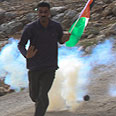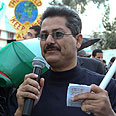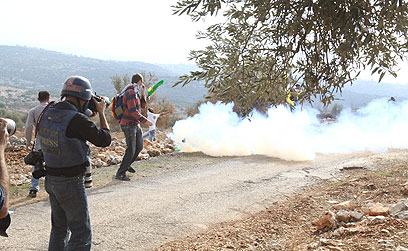


A larger-than-usual crowd gathered Friday for the weekly protest in the West Bank village of Bilin, near Ramallah. The participants marked one year to the arrest of the coordinator of the Popular Committee against the Wall and Settlements, Abdullah Abu Rahma, and the anniversary of the first intifada.
At 11 am, Israeli anarchists and pro-Palestinian activists from the United States, Canada and Germany gathered near the mosque at the village center.
Only Hamas and Hezbollah flags were absent from the rally.
At 12 pm the procession started making its way from the mosque to the security fence, which crosses through the village's farmland.
As the procession drew near the fence, IDF forces opened fire, shooting tear gas at the protesters – who on their part did not provoke the soldiers.
Shortly after, a number of protesters began hurling stones at security forces, and within an hour the rally was dispersed.

Protest in Bilin (Photo: Ohad Zwigenberg)
No injuries were reported, but IDF force detained a Palestinian man and a German activist.
"Since the fence robbed us from hundreds of dunams, we protest here every week for the crime that was committed against us," Dr. Rateb abu Rahma, the brother of jailed Abdullah, told Ynet.
"The army is concerned that the protests are gaining momentum and drawing support that crosses borders and nations," he said.
Rateb commented on his brother's arrest, calling it "ridiculous" – "Abdullah is a peace activist, he did not throw stones – on the contrary, he asked people not to use stones and other violent methods, and he organized a non-violent protest. The army was concerned about his popularity and arrested him," he added.
'Fence meant to annex land'
According to Bilin's Deputy Head of Village Council Muhammad abu Nizad, even after Israel shifted the path of the fence in accordance with the Supreme Court ruling, and the lands were returned to the village – the struggle did not end.
"We are still fighting over 600-700 dunams (about 150-170 acres) that were confiscated from us because of the fence, and were not returned.
"We ask the youth not to hurl stones, but the soldiers provoke us and fire tear gas even before someone tosses stones. That's why the protests always turn violence," he said.

'IDF provokes us with tear gas' (Photo: Ohad Zwigenberg)
In the past, abu Nized recalled, the IDF would allow protesters to approach the fence and speak with residents.
But now, he noted, "the policy has changed and the army shoots at us when we are dozens of meters away from the fence, which of-itself is illegal because non-violent protest is allowed by international law and by the domestic laws of the State of Israel."
"The fence aims to annex more land to the settlements under a security pretext. If this was true, they could have shifted the route of the fence to that of the Jewish communities without taking any Palestinian land,' claimed Ahed Hawaja, who organizes protests in the adjacent village of Naalin.
Despite his anger, Hawaja does not rule out a peaceful solution. "There is no reason why Israelis and Palestinians should not live in peace and mutual respect. We want to live in peace, and have no problem with Israelis. Many of them come here on a regular basis and stay as guests in our village," he added.
"Out problem is with the government's policy, which confiscates lands that have belonged to us for hundreds of years," Hawaja clarified, "We want peace, but we want our lands back – they are our families' source of livelihood."
- Follow Ynetnews on Facebook















